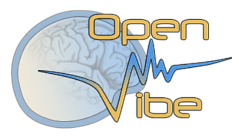
ADT-Inria project, 2012-2014
Partners: Hybrid, Athena, Neurosys, Potioc
OpenViBE (http://openvibe.inria.fr) is an open-source software platform to design Brain-Computer Interfaces (BCI). This software is currently used by numerous users all over the world (more than 10000 downloads since 2009), in the fields of BCI, real-time neurosciences, and even human computer-interfaces and virtual reality. Since its creation in 2005, new usages of OpenViBE appeared as well as new limitations. Over the years, we have identified some lack of functionalities or drawbacks that impact its widespread use and long-term viability. The aim of this project is to further develop OpenViBE, notably in order to (1) make the software evolve towards a new version that fits better current and future needs from its users, (2) to offer new and original functionalities and (3) to keep ensuring OpenViBE support and dissemination. The final objective is to further increase OpenViBE usability and appeal, in order to strengthen the users’ community surrounding the software and enable us to make it as viable and useful as possible, on the long term. The developments will also enable the Inria teams involved (Potioc, Hybrid, Neurosys and Athena) to explore new research directions on BCI, such as adaptive BCI, hybrid BCI, that combines EEG with other physiological sensors (e.g., heart rate, galvanic skin response, gaze, etc.), or new coupling between BCI and virtual reality in order to improve human training for BCI, thanks to new immersive feedback types. Partners : team Hybrid (Inria Rennes Bretagne Atlantique), team Athéna (Inria Sophia-Antipolis Méditerranée), team Neurosys (Inria Nancy Grand-Est), team Potioc (Inria Bordeaux Sud-Ouest) Duration : 2 years (2012-2014) Coordinator : Anatole Lécuyer (Inria Rennes Bretagne Atlantique) funded by Inria (Technological Development Project) See associated works.






